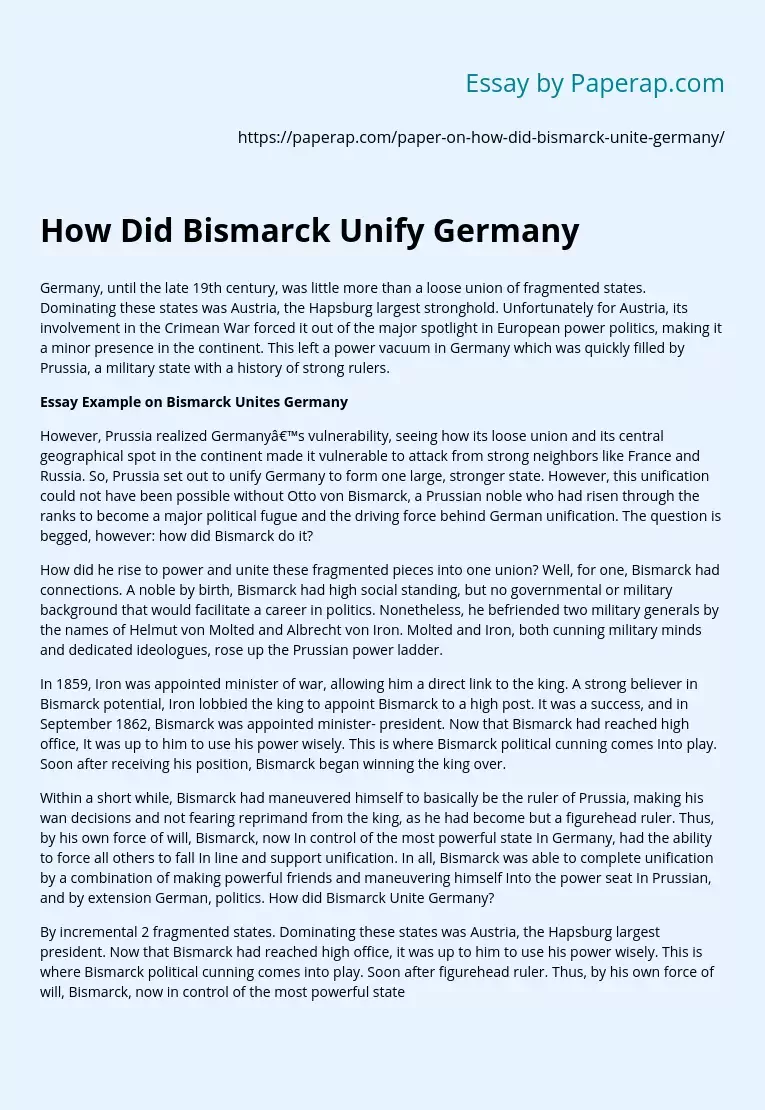How Did Bismarck Unify Germany
Germany, until the late 19th century, was little more than a loose union of fragmented states. Dominating these states was Austria, the Hapsburg largest stronghold. Unfortunately for Austria, its involvement in the Crimean War forced it out of the major spotlight in European power politics, making it a minor presence in the continent. This left a power vacuum in Germany which was quickly filled by Prussia, a military state with a history of strong rulers.
Essay Example on Bismarck Unites Germany
However, Prussia realized Germany’s vulnerability, seeing how its loose union and its central geographical spot in the continent made it vulnerable to attack from strong neighbors like France and Russia.
So, Prussia set out to unify Germany to form one large, stronger state. However, this unification could not have been possible without Otto von Bismarck, a Prussian noble who had risen through the ranks to become a major political fugue and the driving force behind German unification. The question is begged, however: how did Bismarck do it?
How did he rise to power and unite these fragmented pieces into one union? Well, for one, Bismarck had connections.
A noble by birth, Bismarck had high social standing, but no governmental or military background that would facilitate a career in politics. Nonetheless, he befriended two military generals by the names of Helmut von Molted and Albrecht von Iron. Molted and Iron, both cunning military minds and dedicated ideologues, rose up the Prussian power ladder.
In 1859, Iron was appointed minister of war, allowing him a direct link to the king.
A strong believer in Bismarck potential, Iron lobbied the king to appoint Bismarck to a high post. It was a success, and in September 1862, Bismarck was appointed minister- president. Now that Bismarck had reached high office, It was up to him to use his power wisely. This is where Bismarck political cunning comes Into play. Soon after receiving his position, Bismarck began winning the king over.
Within a short while, Bismarck had maneuvered himself to basically be the ruler of Prussia, making his wan decisions and not fearing reprimand from the king, as he had become but a figurehead ruler. Thus, by his own force of will, Bismarck, now In control of the most powerful state In Germany, had the ability to force all others to fall In line and support unification. In all, Bismarck was able to complete unification by a combination of making powerful friends and maneuvering himself Into the power seat In Prussian, and by extension German, politics. How did Bismarck Unite Germany?
By incremental 2 fragmented states. Dominating these states was Austria, the Hapsburg largest president. Now that Bismarck had reached high office, it was up to him to use his power wisely. This is where Bismarck political cunning comes into play. Soon after figurehead ruler. Thus, by his own force of will, Bismarck, now in control of the most powerful state in Germany, had the ability to force all others to fall in line and combination of making powerful friends and maneuvering himself into the power seat in Prussian, and by extension German, politics.
How Did Bismarck Unify Germany. (2019, Nov 27). Retrieved from https://paperap.com/paper-on-how-did-bismarck-unite-germany/

